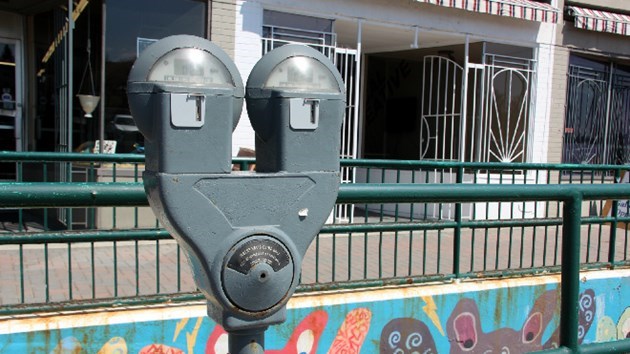A local resident wishes Orillia was more like Lindsay.
D.H. Hollands says Lindsay “treats its handicapped citizens far better” than Orillia, noting the city east of us permits free parking for those with accessible parking permits at all of its metered spots. With that in mind, Holland obtained 27 signatures on a petition calling for Orillia to adopt a similar approach.
“Although there will be a loss of meter revenue, the benefit to the local merchants will be greater,” Hollands said in the letter to council. “Handicapped drivers will give their (business) to the local merchants instead of the large box stores where parking is free.”
Hollands has felt the frustration, locally, first-hand. “Last winter, I had to visit a local (store) but all the handicap parking spots were full. Because of the treacherous walking conditions (ice and snowbanks) and because I didn't bring any small change, I risked parking at a meter (without paying). To my dismay, I returned to find a $15 parking ticket. This would not have happened in Lindsay.”
The letter and petition sparked city staff to investigate the idea and, after researching the concept, staff advised council not to go down this road.
Despite that recommendation, Orillia Mayor Steve Clarke thought the idea was a good one and was poised to champion the idea at the council table. He said he was “initially strongly in favour” of the plan because a lack of access to parking “can be a significant deterrent for people coming into the core of the city.”
However, he said the city’s plan to develop a phone application for downtown parking will address those concerns without adding more accessible parking spots or changing the city policy to grant free access to disabled citizens to all metered spots.
Clarke noted the app, initiated by council last year, was recently approved the city’s Parking Working Group and, last week, was endorsed by the Downtown Orillia Management Board. With support from those groups, the new app can now move forward and should be ready to use this summer.
“The goal of the Parking Working Group is to make parking more user-friendly and this does that and helps get rid of or lower ticket anxiety,” said Clarke, noting drivers can have warnings sent to their smart phones to alert them when their meter will expire. “It is also a benefit to those with mobility issues,” he said, explaining they can pay for their ticket with their phone and not have to navigate their way to parking ticket machines.
But Coun. Sarah Valiquette-Thompson said she was concerned the technology is not yet at everyone’s fingertips. She said she supports the idea but “the only concern I have is for those who are not technology” savvy, noting she has relatives who may not be able to “wrap their head around” this idea.
With that in mind, council decided to implement the app and test it for a trial period. Simultaneously, the Parking Working Group will try to come up with an alternative plan for those who may not have smart phone technology.
The hope is the new technology will work because staff had many concerns about granting free parking to everyone with a Ministry of Transportation (MTO) accessible parking permit.
According to the staff report tabled at Monday’s meeting, there are 18,560 residential addresses in Orillia (within the L3V postal code) and, according to the MTO, there are 3,209 accessible parking permits issued within this area, which is about 17% of the households.
Orillia has 1,095 municipally-owned parking spaces in the downtown area, with 704 of these spaces available for metered parking. Of the 704 metered spaces, there are 181 metered on-street parking spaces with an additional eight accessible on-street parking spaces, and 490 metered off-street parking spaces with an additional 25 off-street accessible parking spaces.
Approximately 5% of all metered municipally-owned parking spaces downtown are designated as accessible parking, the report notes. Allowing an estimated 17% of the user base to park for free in municipal parking spots would have an adverse impact on parking revenues; it is estimated that this would have a net impact of a 12% drop in meter revenue.
Free parking for accessible parking permit holders, the staff report said, would also not address the issues in the petition. In essence, such a policy, the report says, will not alter the stock of “accessible” spots, meaning permit holders will have to park further away. In addition, the “abuse and counterfeit of the accessible parking permits has the potential to be a significant issue as seen in other municipalities where accessible permit holders are able to park for free in municipal parking areas.”
